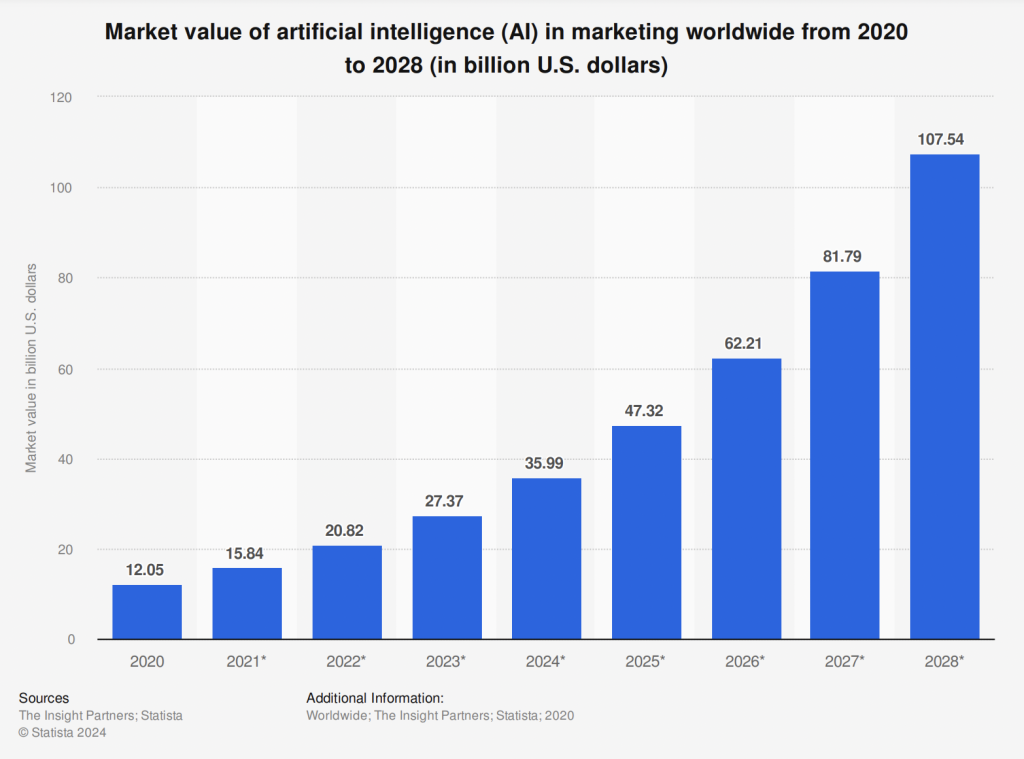
Marketing has always been a crucial aspect of business success. It helps build brand reputation, enhance customer experience, and attract the right audience. Over the past century, marketing has evolved from traditional methods to digital approaches, including web-based marketing, social media marketing, mobile app marketing, and search engine optimization (SEO). While these approaches have seen great success, a new technology is rapidly gaining traction and is set to become a major trend—Artificial Intelligence (AI). In this discussion, let us dive into the profound impact of AI on modern digital marketing.
Surprisingly, over 80% of marketers are already using AI in their marketing strategies and the market value of AI in marketing is expected to continuously grow significantly, from $12.05B in 2020 to $107.54B in 2028 (Statista, Dec 2024). As AI technology continues to advance, many marketing tasks can now be automated within seconds with minimal human intervention. These include AI-driven bidding, personalized recommendations, content creation, and enhanced customer experience—all of which will be explored in detail below.

AI-driven bidding
AI enables businesses to collect, process, and analyze vast amounts of data efficiently and accurately. Some companies even conduct real-time data analysis and make immediate decisions using advanced AI tools.
One example is AI-powered bidding in digital advertising. Google Ads’ Smart Bidding function allows marketers to bid for ad placements at different prices for the same campaign across multiple websites. Simultaneously, AI ensures that advertisers connect with the most relevant audiences by matching ads to the appropriate website content. In essence, it functions as both a demand-side platform (DSP) and a supply-side platform (SSP). Behind the scenes, complex algorithms power the system. Let me simplify this.
How It Works
- Advertisers offer ad placements on their websites, providing details about their target audience.
- Marketers set predefined rules and marketing goals, such as optimizing Cost Per Acquisition (CPA).
- AI collects data from both sides, processes it, and conducts an automated bidding process.
- The system matches the most suitable ads to the right websites, maximizing ad performance and efficiency.
Without AI, this level of precision and automation would have been nearly impossible. AI-powered bidding not only boosts operational efficiency but also ensures that the right content reaches the right audience at the right time.
Personalised recommendations
AI can process real-time data, analyze user behaviour patterns, and predict future actions. This allows businesses to deliver highly targeted recommendations. Amazon, for example, is a leader in AI-driven personalization. By analyzing customers’ past purchases and browsing history, Amazon’s AI identifies individual interests and tailors product recommendations. This personalization extends beyond the homepage—every product page displays recommendations unique to each user. By aligning with users’ interests, AI increases engagement and improves conversion rates, ultimately driving higher sales.

Screenshot captured from a personalised recommendation on Amazon website.
Creating advertising content & campaigns
AI is also transforming content creation for digital marketing. Traditionally, content required human creativity, but today, AI-powered tools like ChatGPT, Jasper AI, and Canva AI can generate high-quality marketing materials in seconds. Some may argue that AI, as an emotionless machine, lacks the ability to create content that resonates with audiences. However, with advancements in Natural Language Processing (NLP) and Sentiment Analysis, AI now understands human emotions and language nuances. As a result, it can generate engaging ad copy, and even social media posts that capture audience attention. Additionally, AI-driven image and video generators allow brands to create stunning visuals instantly. This technology not only enhances content quality but also improves efficiency, enabling businesses to scale content production at an unprecedented rate.
Enhancing customer experience
In the digital era, customers expect instant responses and seamless interactions. AI-powered chatbots and virtual assistants have revolutionized customer support by providing 24/7 assistance and resolving inquiries in real-time.
By integrating AI into customer service, businesses achieve:
- Faster response times without the constraints of business hours
- Improved service quality, as human agents can focus on complex issues.
- Higher customer satisfaction, leading to better brand loyalty.
Beyond support, some companies use AI for interactive marketing campaigns. A great example is Coca-Cola’s “Create Real Magic” campaign in 2023, in collaboration with OpenAI. This initiative allowed digital artists to create unique AI-generated artwork featuring Coca-Cola’s brand elements. The campaign successfully strengthened brand loyalty and deepened customer engagement.

To conclude, AI has become an indispensable tool in digital marketing, offering automation, efficiency, and innovation. By leveraging AI, businesses can reduce manual workload, analyze massive datasets instantly, make data-driven decisions, and generate unique content at scale.
As AI adoption in marketing grows, competition will intensify. The key to success lies in strategically integrating AI into marketing strategies to maximize its potential. For marketers, the challenge ahead is clear—to embrace AI effectively and stay ahead of the evolving digital landscape.
What are your thoughts on AI in digital marketing? Do you think AI will replace human marketers, or will it serve as a powerful assistant? Share your insights below!